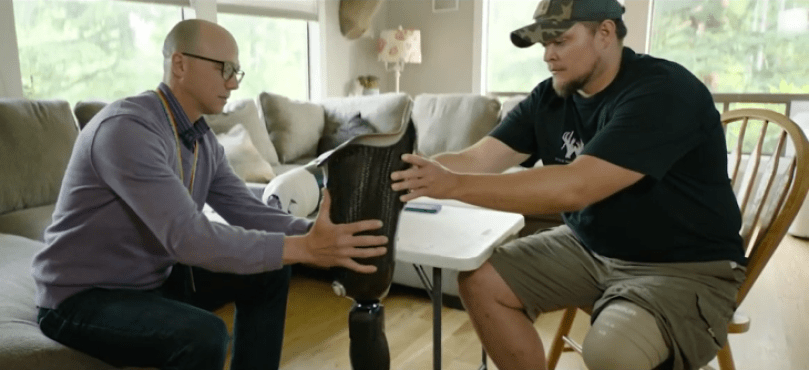In the southern foothills of the Olympic Mountain Range is the sleepy logging town of Aberdeen—about 100 miles from Seattle. The picturesque “Evergreen State” serves as a sanctuary, an ideal place for Army Veterans Matthew Houston and his wife Theresa to raise their three children.

VA Mobile OPS pilot program brings prosthetic care to Veterans with travel challenges, like Army Veteran Matthew Houston.
Matthew lost part of his left leg from a gunshot wound while serving in Iraq in 2003. This home environment allows him to better manage his severe post-traumatic stress disorder (PTSD).
“My PTSD has reached a point where leaving my home causes panic attacks,” said Matthew. “I was so scared to go out in public. I was refusing into go to the VA and take care of my prosthetics. My physical and mental condition has almost made it impossible to manage my health appropriately.”
Overcoming challenges
Matthew is very active and loves hunting and fishing. He shares his adventures with us while receiving prosthetic care at the Seattle VA Medical Center (VAMC).
Getting to his appointments at the VAMC is not easy. His five-hour roundtrip drive coupled with city traffic can trigger Matthew’s PTSD. As a result, he has a pattern of rescheduling and canceling appointments. At one point, Matthew walked on a malfunctioning prosthesis for three years.
Aware of some of his challenges, the VA Puget Sound prosthetic team developed a solution that’s in an exploratory phase we call Mobile Orthotic & Prosthetic Services (Mobile OPS). It’s a home-based pilot program designed to help patients with travel challenges or barriers who need prosthetic care.
We reached out to Matthew and set up a home visit. Upon arriving, I saw a steep gravel driveway and some other challenges he faces daily. Matthew has a high-level amputation above the knee; achieving a comfortable, secure prosthetic fit specific to his anatomy is complex. His tall and muscular stature is hard on his residual limb and prosthetic equipment.
Constructing a new prosthesis for Matthew required 11 appointments spanning seven months. I consulted with other rehab team members via secure video conferencing to explore more effective prosthetic solutions. While this may seem like a long time for one prosthesis, it took nearly four years for Matthew to attend the same number of prosthetic appointments at the VA.
Clinic vs. Real World
Seeing patients in clinic doesn’t give a full picture of real-world challenges they encounter. Since building the new prosthesis, Matthew’s been on three hunting expeditions and spends more time outdoors with his family.
“I feel very privileged to have VA come to my home to do my prosthetic care.” said Matthew. “This leg is phenomenal, you know, it has allowed me to do some great things with my life. Seeing VA taking another step forward to offer a service like this really shows me that they are taking the Veterans’ feedback and they genuinely care.”
We’re breaking down barriers to care. This program is designed to help Veterans who have challenges coming to see us at our VA facilities. For some, being seen in a comfortable place is essential.
As simple as it sounds, it’s also radical. Mobile OPS allows us to work with the Veteran in their home environment, providing us an opportunity to give the best possible care.
G. Eli Kaufman is a research prosthetist at the VA Puget Sound Health Care System
Topics in this story
More Stories
Bob Jesse Award celebrates the achievements of a VA employee and a team or department that exemplifies innovative practices within VA.
The Medical Foster Home program offers Veterans an alternative to nursing homes.
Watch the Under Secretary for Health and a panel of experts discuss VA Health Connect tele-emergency care.







